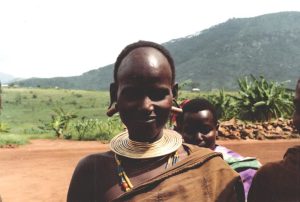The Barabaig Woman
by Sr. Margaret Garnett MMM (1920 – 1990) England 14.10.2023
First published in 1989. Sr Margaret, a medical doctor, spent all her missionary life in Tanzania.
 The Barabaig are a nomadic and pastoral people who live in Tanzania and have many difficulties as more and more land becomes cultivated and there is less pastureland for their herds and flocks.
The Barabaig are a nomadic and pastoral people who live in Tanzania and have many difficulties as more and more land becomes cultivated and there is less pastureland for their herds and flocks.
When I think about the women of the Barabaig tribe I am reminded of the Ideal Wife described in the Book of Provers; even though their environment and culture are very different from those women of Israel. Yet, the words of Proverbs can be applied to her.
The Barabaig woman has neither wool not flax, but she makes her clothes from the hides of goats and decorates them beautifully with beads, using her ‘skilled hands’.
She ‘secures her provisions from afar’. It may take her as much as an hour every morning and every evening to draw water for the needs of her household. It takes the whole day to gather enough firewood for the week’s cooking. Her menfolk travel far with their donkeys to buy maize. ‘She is girt about with strength and sturdy are her arms’ as she grinds the maize between two stones to prepare the family food. ‘She rises while it is still night’ to milk the cows before her sons and daughters take them out to pasture. ‘She is clothed with strength and dignity and laughs at the days to come.’
When expecting a baby, she attends the antenatal clinic at the first sign of pregnancy, for she understands how easy it is to lose a baby in the early months of pregnancy if she gets malaria or if she becomes anaemic. She them becomes a regular attender and, if she knows the Swahili language, she will interpret for her less knowledgeable friends. There are no secrets between the women. They discuss each other’s problems and try to find solutions. ‘She opens her heart in wisdom and on her tongue is kindly counsel.’
When the baby is born custom dictates that she spends a month in the house without going out, but she will break this custom in order to bring her baby to the clinic as soon as possible so that he or she may receive BCG vaccination to prevent tuberculosis. The only time in her life when she may carry a stick is after delivery. If the baby is a boy, she also carries an arrow.
She will bring her each month to the clinic for weighing and vaccination and she will also bring her relatives’ and neighbours’ children if for any reason, their own mother cannot come. Thus, does she ‘extend her arms to the needy.’ As in the world in general, so the Barabaig world is a man’s world. But if the older women, as a group, officially make a decision, the men have to obey!
To such women we can say, ‘Give her a reward of her labours and let her works praise her.’
SEE ALL BLOG POSTS
